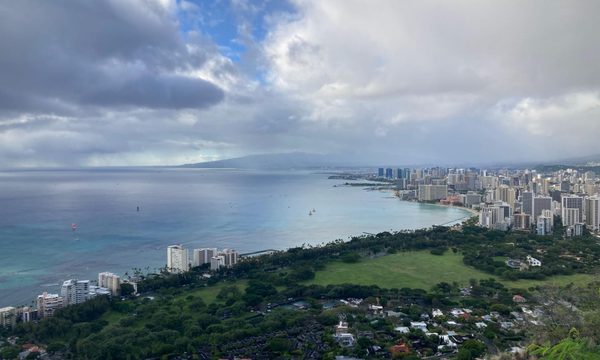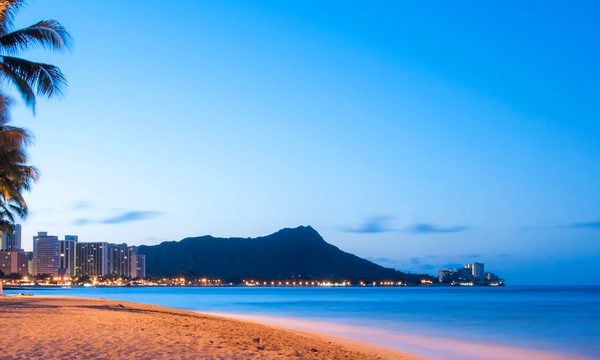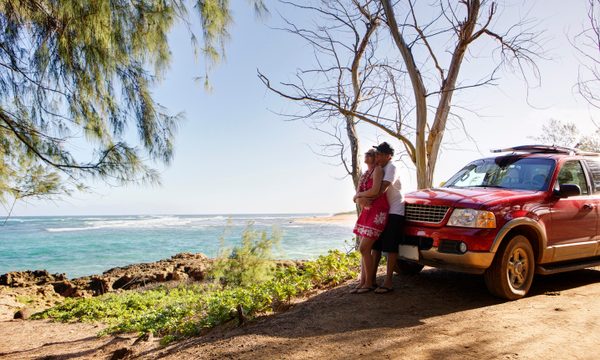Should I Rent a Car in Honolulu?
Public transit, bike shares and your own two feet offer cheaper alternatives to renting a car in Oahu.
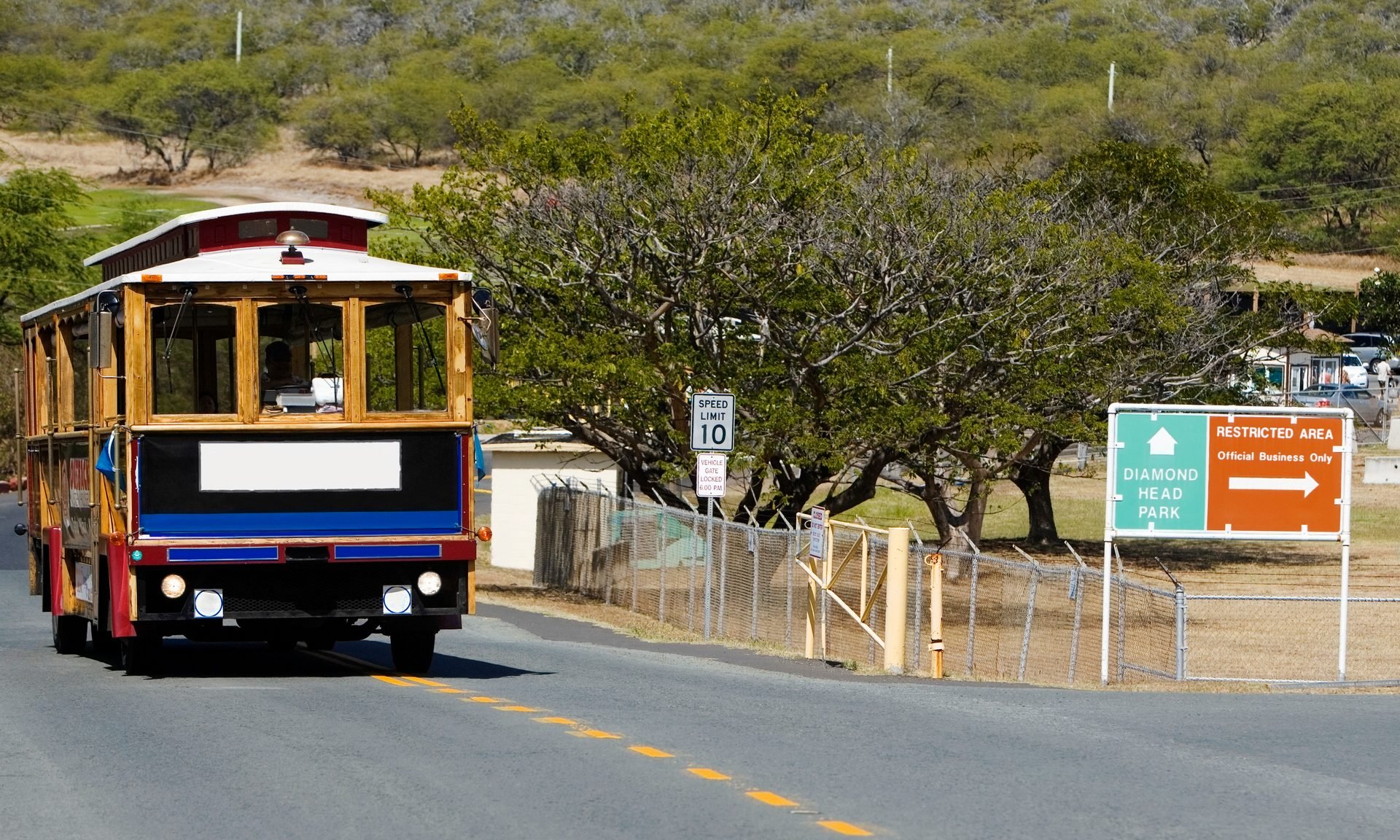
Many or all of the products on this page are from partners who compensate us when you click to or take an action on their website, but this does not influence our evaluations or ratings. Our opinions are our own.
While U.S. rental car prices are down from the all-time highs recorded in July 2021, they’re still high. The average U.S. rental car price this month is still higher than prices for the same period in 2019. And one of those places where rental car prices can feel especially high is Honolulu, Hawaii.
Not only are Honolulu rentals expensive, but many resorts charge outrageous parking fees. Honolulu’s median hotel parking fee is the third-highest of all the cities NerdWallet analyzed in its search of the best hotel rewards program at $46.06 per night, behind only New York ($50) and Chicago ($56).
And don’t forget gas. Hawaii has historically had the highest average gas prices, regardless of fuel type, of any state, according to data from AAA.
Given the high costs of renting cars, gas and parking, you might consider ditching driving for your next Oahu vacation. But how realistic is it to navigate Oahu without a rental car? If you're trying to explore the island beyond Honolulu, a rental car is pretty much necessary. For tourists staying in the North Shore and Ko Olina, you'll likely want a car.
But what if you're just staying in Honolulu? For travelers who don’t mind extra walking, are willing to wait for a bus and aren’t opposed to occasionally hailing a taxi, skipping car rentals in Honolulu can be a huge money saver. Here’s how to get around Honolulu and other Oahu destinations without a car.
» Learn more: Save on Hawaii travel even as demand soars

By signing up, you will receive newsletters and promotional content and agree to our Terms of Use and acknowledge the data practices in our Privacy Policy. You may unsubscribe at any time.
Public transportation
Redfin, an online residential real estate brokerage, lists Honolulu as the 11th-best major city for public transportation according to its 2019 Transit Score rankings, its latest set of data.
Oahu’s public bus service is called TheBus, and cash fares are $3. About 117,000 people, roughly a third of Honolulu’s population, ride the bus on an average weekday, according to third-quarter 2022 data from the American Public Transportation Association, a nonprofit that advocates for the interests of the public transportation industry.
American tourists are less enthused.
In 2019, less than 9% of out-of-state American tourists used Oahu’s public buses. Meanwhile, about 60% of Americans used a rental car.
Buses can sometimes take about twice as long as driving given the number of stops. They occasionally run late and — during busy hours — they can be crowded. But sometimes the difference is negligible, and some routes, in particular, are well-suited to bus riding.
On the express bus, it can take about 25 minutes to get from the Hilton Waikiki Beach to Iolani Palace versus 16 or 17 minutes to drive. But you’ll have to pay $4 to park at Iolani Palace, where parking is limited, so you might spend extra time searching for a spot on top of the $45 you likely spent on Hilton parking.
Google Maps makes it easy to navigate bus routes, and it also displays up-to-date information accounting for delays.
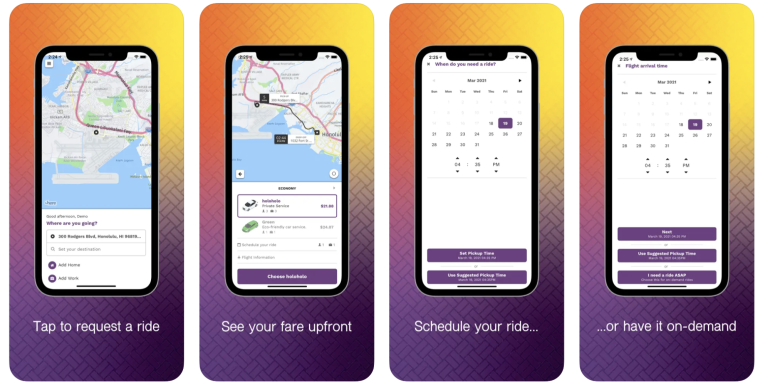
The Holoholo app.
Taxis and rideshare companies are readily available in most parts of Oahu, especially in popular tourist areas. To save even more, pay with certain credit cards that offer bonus points on certain rideshares.
For those seeking an alternative to the usual apps, there’s also a locally owned rideshare company in Hawaii called Holoholo that operates very similarly. Passengers can request a ride from the Holoholo smartphone app, and they’re assigned to a driver typically within a few minutes. Fares are displayed upfront as a fixed cost and can be paid through the app with a credit card.
According to Holoholo’s fare estimator, it usually costs about $45 to ride from Waikiki hotels to the airport.
Trolley tours
If your goal is to hit several popular tourist spots near Honolulu like Diamond Head, the Duke Kahanamoku statue, Chinatown and Punchbowl Crater, your best bet might be the Waikiki Trolley. A one-day, unlimited adult pass costs $55, while a seven-day adult pass costs $75. Depending on the route, trolleys run every 20 to 90 minutes.
Routes are curated toward tourist-friendly locations, so it’s unlikely you’ll end up lost.
The Waikiki Trolley’s newest route is structured around Hawaii’s food scene, with stops at local favorites such as Leonard’s Bakery, a cafe credited with popularizing the malasada, a donut-like staple in Hawaiian cuisine.

Lodging or activity providers
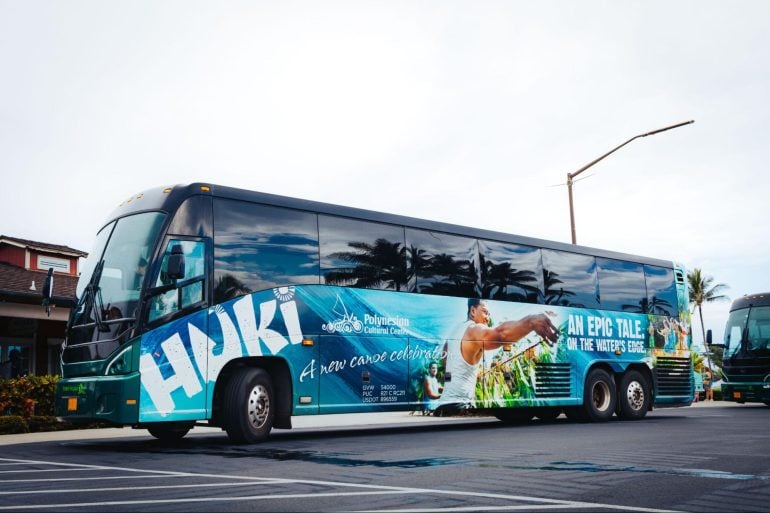
Some hotels and excursion operators work with shuttle companies to provide transportation to other major destinations, like Honolulu’s Daniel K. Inouye International Airport (HNL). Sometimes the shuttle cost is included in the overall price, as is the case with Coral Crater Adventure Park. Packages for activities such as ATV rides and zipline tours here include transportation to and from your Waikiki hotel.
🤓 Nerdy Tip
Waikiki is a neighborhood within Honolulu. Sometimes, lodging or activity providers will offer shuttle services as an add-on fee. For example, Aulani, A Disney Resort & Spa in Ko Olina, works with Hele Hele Transportation to shuttle guests rides between the resort and Honolulu’s Daniel K. Inouye International Airport for $25 per person each way.
Another popular destination on Oahu, the Polynesian Cultural Center, offers activities including a luau, canoe tours, crafts, games and lessons in skills like spear-throwing and cooking.
The center offers a $26 per person round-trip shuttle ticket on top of the usual entrance price, saving you from making the roughly hourlong drive yourself. With it, travelers are picked up in Waikiki in the morning and returned about 12 hours later, leaving enough time for all the activities.
Walk or bike
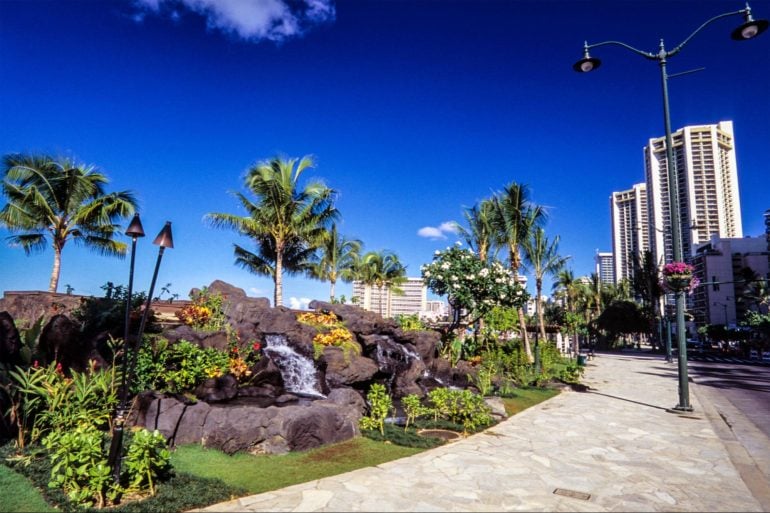
Pack good walking shoes because many of the major hotels are in pedestrian-friendly areas. For instance, it’s a gorgeous, 45-minute beachfront walk from most of the Waikiki hotels to Diamond Head.
Many tourist attractions are close to each other. For example, the Hawaii State Capitol, Maunakea Marketplace, the Hawaii State Art Museum, the Hawaii Theatre, Iolani Palace and the Foster Botanical Garden are all within less than a mile of each other.
While traditional bike rental companies exist, a convenient way to rent a bike is through the local bike share service Biki. The company has about 1,300 bikes spread across about 130 self-service ‘Biki Stops’ throughout downtown Honolulu, which can be unlocked through the mobile app. A single, 30-minute ride costs $4.50, or you can purchase a bank of 300 minutes (that’s five hours) for $30.
What’s coming to Honolulu public transit next?
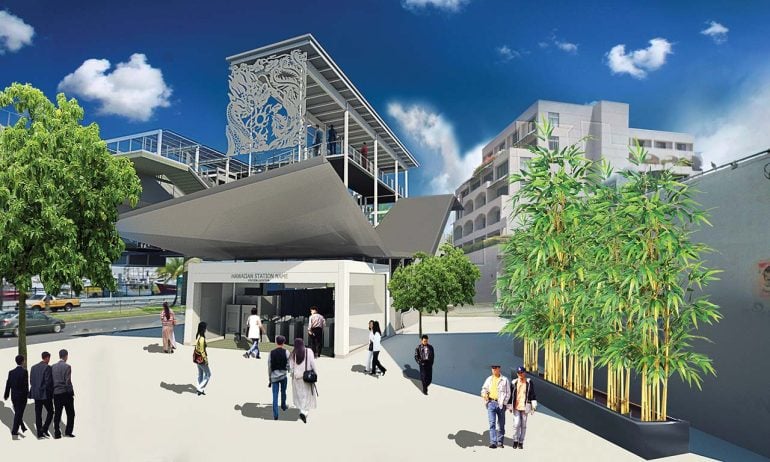
Hawaii public transit could get even better soon. While the Honolulu Rail Transit Project has been in development for years and trial test runs began in August 2022, it is slated to open sometime in 2023, though tracks around the airport and city center aren’t scheduled to open until 2031.
By some metrics, Hawaiian tourism is bigger than even its pre-pandemic levels, and data suggest growth is only just getting started. For now, the majority of Americans still rely on a rental car in Oahu.
But in the future, it’s even less likely you’ll need to rent a car in Oahu — and you may not need one now, either.
How to maximize your rewards
You want a travel credit card that prioritizes what’s important to you. Here are some of the best travel credit cards of 2026:
- Flexibility, point transfers and a large bonus: Chase Sapphire Preferred® Card
- No annual fee: Wells Fargo Autograph® Card
- Flat-rate travel rewards: Capital One Venture Rewards Credit Card
- Bonus travel rewards and high-end perks: Chase Sapphire Reserve®
- Luxury perks: American Express Platinum Card®
- Business travelers: Ink Business Preferred® Credit Card
Article sources
NerdWallet writers are subject matter authorities who use primary,
trustworthy sources to inform their work, including peer-reviewed
studies, government websites, academic research and interviews with
industry experts. All content is fact-checked for accuracy, timeliness
and relevance. You can learn more about NerdWallet's high
standards for journalism by reading our
editorial guidelines.
Limited Time Only: Earn $1,000 Toward Travel!
Capital One Venture Rewards Credit Card 
Travel

For a limited time, the
Capital One Venture Rewards Credit Card is offering new cardholders an especially rich bonus: Enjoy $250 to use on Capital One Travel in your first cardholder year, plus earn 75,000 bonus miles once you spend $4,000 on purchases within the first 3 months from account opening - that’s equal to $1,000 in travel!
More like this
Related articles


